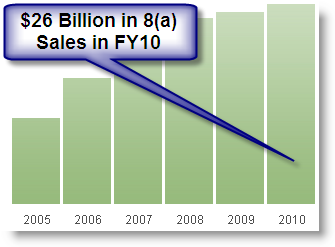Continuing with our discussion of the U.S. Small Business Administration’s 8(a) Business Development Program, recent rule changes have affected the program and its offerings. The SBA recently published a final ruling, scheduled to take affect on March 14, 2011, that will strengthen the 8(a) Program by preventing waste, fraud and abuse. In sum, the Final Ruling should better ensure the benefits of the program properly flow to the intended recipients.
 These rule changes represent the first comprehensive overhaul of the 8(a) program in more than 10 years. In order to best understand the program’s practical shortfalls, the SBA conducted a thorough research and planning process. This process included two opportunities for feedback and input. First, small businesses were invited to offer constructive criticism of the 8(a) program in its current form. After evaluation and additional research, the SBA proposed a set of revisions, which were again open for comment. After considering these comments, the SBA passed the final ruling which is set to revamp the program. SBA Administrator Karen Mills said of this involvement, “SBA gained valuable input from members of the small business community on ways to strengthen the program and provide the best opportunities for eligible firms.”
These rule changes represent the first comprehensive overhaul of the 8(a) program in more than 10 years. In order to best understand the program’s practical shortfalls, the SBA conducted a thorough research and planning process. This process included two opportunities for feedback and input. First, small businesses were invited to offer constructive criticism of the 8(a) program in its current form. After evaluation and additional research, the SBA proposed a set of revisions, which were again open for comment. After considering these comments, the SBA passed the final ruling which is set to revamp the program. SBA Administrator Karen Mills said of this involvement, “SBA gained valuable input from members of the small business community on ways to strengthen the program and provide the best opportunities for eligible firms.”
To this end, the rule changes passed by the SBA include the following:
-8(a) firms must perform 40 percent of the work of each Joint Venture Contract award that involves an 8(a) firm.
-Improvements to the Mentor-Protégé Program, principally designed to ensure mentor firms properly fulfill their duties to protégés.
-Economic Disadvantage requirements and restrictions have been clarified.
-Ownership and Control requirements and restrictions have been clarified.
-Excessive Withdrawals restrictions have been clarified.
-Business size qualification restrictions have been amended. (Subscribe to the TurboGSA Fed Marketing Blog for more information on SBA size restrictions in the near future.)
-Requirements and Restrictions relating to Tribally-Owned firms have been amended.
Hopefully, the practical knowledge used to guide these rule changes will help the real world results of the program better reflect its purpose. For more detail on specific rule changes, visit http://www.sba.gov/content/revised-8a-regulations. As always, if you have further questions or concerns regarding how the rule changes effective March 14th affect your small business’s strategy, please contact us.



